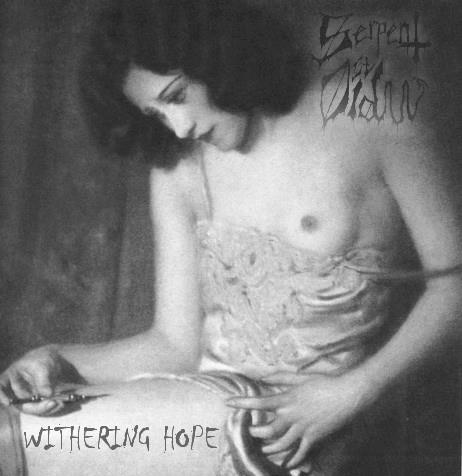
S E R P E N T O V O L D
Withering Hope
2012 Era Horrificus
It is the way of things that genres arise from culture and philosophy, as well as from personal interpretions of that culture and philosophy. In the case of metal, we see its subgenres and styles mingling in different ways to different degrees of acceptance and satisfaction by audience, artists and critics. In the case of Serpent ov Old, this has taken the form of an amalgamation of black metal and power metal, which has surprisingly and graciously bypassed the technicisms of death metal. And while there is word of power metal taking up death metal techniques into its repertoire, the mainstay of power metal has never executed this transition. The truth of the matter is that the melodicity and emphasis on comprehensible chord progressions of power metal has more to gain from the elegant emphasis on melodies-made-flows that the best of black metal has mastered inwardly. At the same time, Serpent ov Old makes music that stands primarily as evocative music elevated above discussions on techniques or style, even if the techniques and ways of expression have been clearly adopted from the sources mentioned above.
Serpent ov Old builds music by stating themes in the fashion of power metal, while balancing —purging— the saccharine effects by the application of black metal underpinnings in percussion, vocalization and guitar strumming. What we can hear is a music dominated by harmonic movement across which significantly active melodic lines move. Tension is built and released and then recaptured by both the melodic-harmonic interplay of lessons learned from black metal here, and those adopted from power metal there. Furthermore, the textural effects of the percussion and how these affect impulse, constriction and relaxation are taken primarily from black metal. The band makes this work by connecting power metal and black metal techniques to their common speed metal foundations, meaning that in many of the cases, the approach of the central riffing and percussion could fall into a nebulous area which both genres share in mature forms of speed metal, although this ambivalence is usually resolved towards black metal. As a whole, power metal is used as a bombastic paintbrush that allows Serpent ov Old to magnify the usually understated dramatism of black metal.
All this has to be accomplished tastefully, and we never find a reliance on trope or techniques: compositions are driven by the central, “invisible” essence of motion and contrast, and fluctuations of power and direction, by and for which the instrumentation exists. The “shredding” abilities of the guitarists in this work are used much in the same way that Trey Azagthoth’s atonal noise solos ripped through old Morbid Angel songs: as hyeroglyphs rather than as pretentious elaborations. These are to be taken as impressionist impressions, and should not be confused as baroque virtuosic displays, for such scale-based quasi noise shreds lack the self-sufficiency of the proper baroque solo instrument that we would hear in a work for viola da gamba by Marin Marais, for instance. And as one listens to the music more and more closely, subsequent spins allow the listener to perceive these relations properly, allowing them to see where the backbone is located, and how the peaks and valleys are formed by the creators of this landscape of poetic rashness.
The music of Serpent ov Old is fierce romantic dramatism akin to powerful forces of nature that destroy yet also create. By adopting and moderating the extroverted expression of power metal and delicately subsuming it under black metal, Serpent ov Old makes the music genres escape the narcissistic trap and makes them serve a transcendent expression of inner experience. Furthermore, this profound experience, if authentic, is one of darkness and anguish; but which darkness and anguish, if contronted and assimilated unto individuation, can presumably lead to the creation of a new type of being. However, the music is still limited by this personal flavor, which still tends to be merely inward looking, but not yet deep enough that a new space is opened up through the self as a gate. We may say that this is ultimately a question of personal experience, reflection and individual meaning. But ultimately, as music, it must be able to develop the ability to somehow come up with an aural language that can communicate a general intimation of what is presenced from beyond.
Note: We might yet see Withering Hope released under the banner of Deathwave Nexion.
1 CommentTags: 2012, Black Metal, deathwave nexion, power metal, serpent ov old, withering hope

